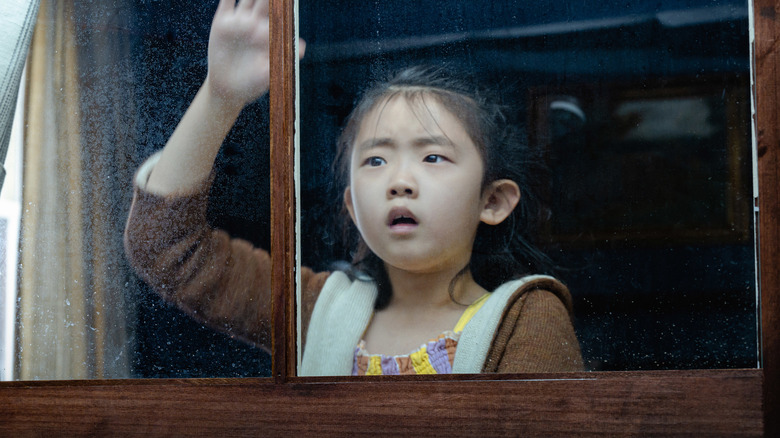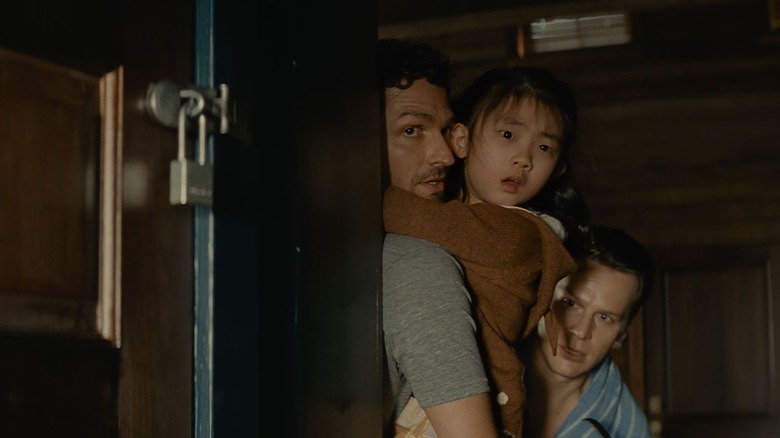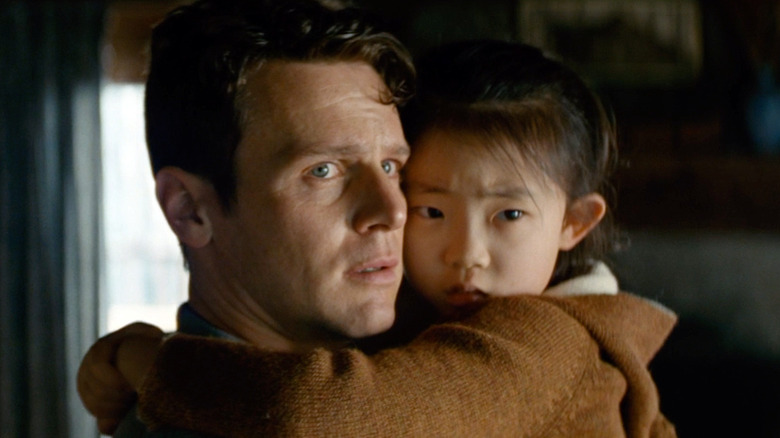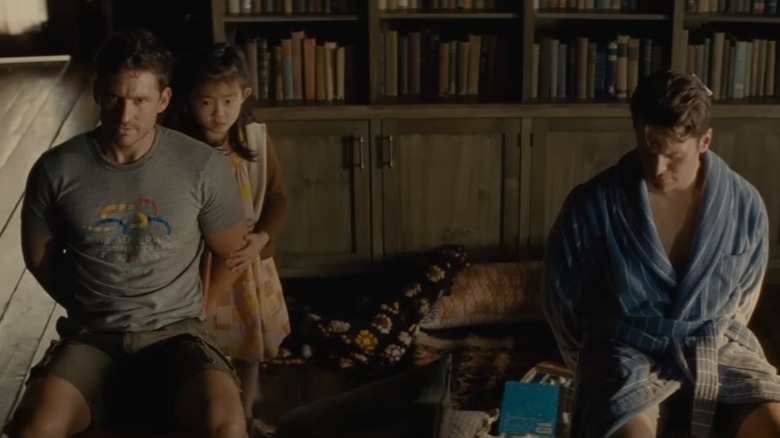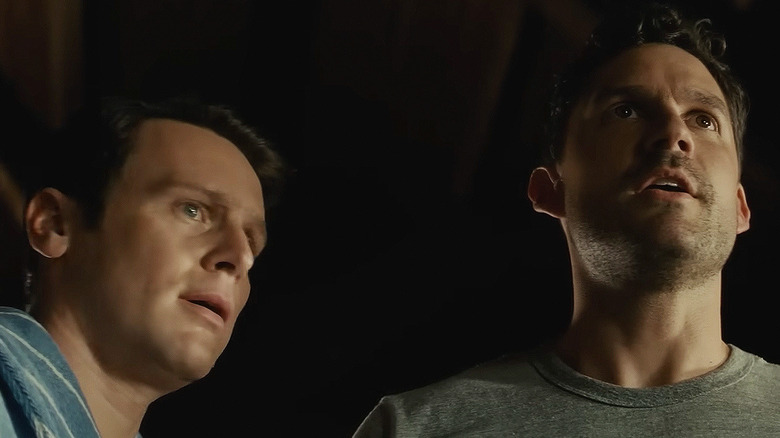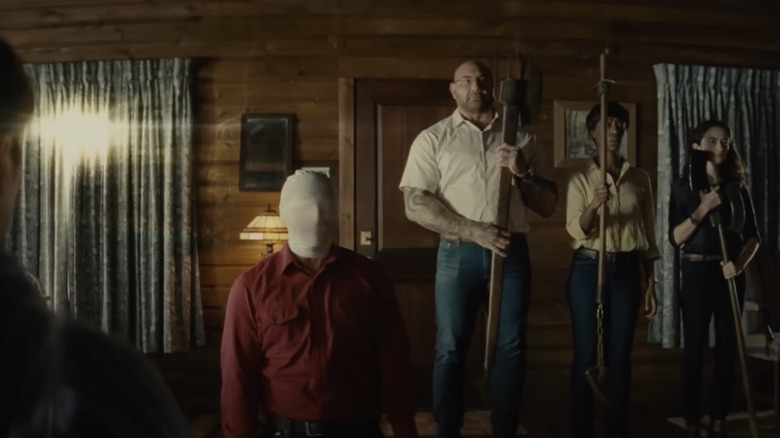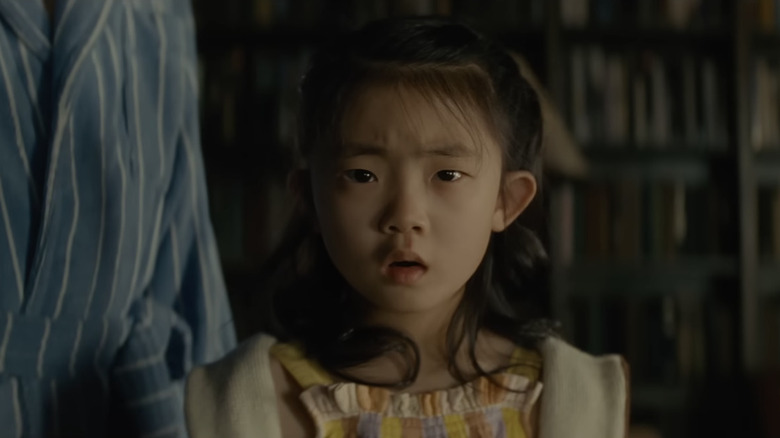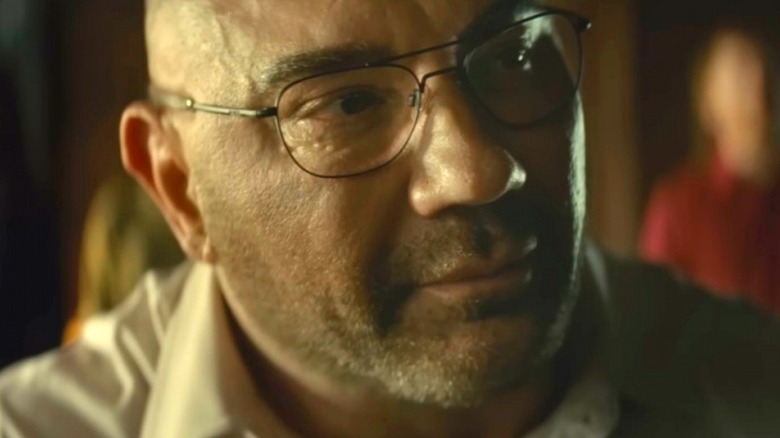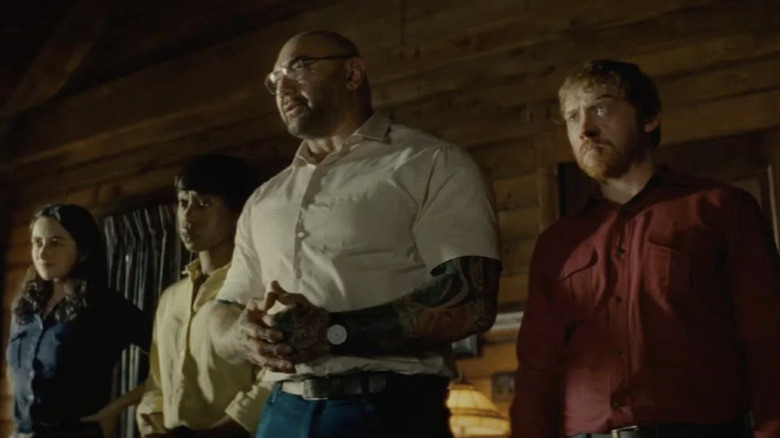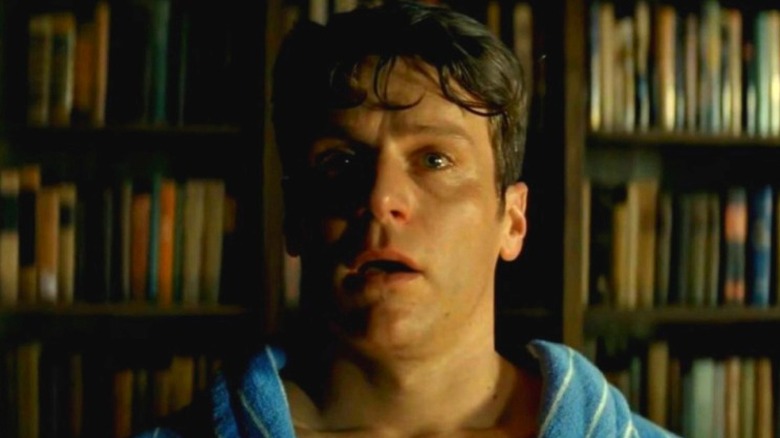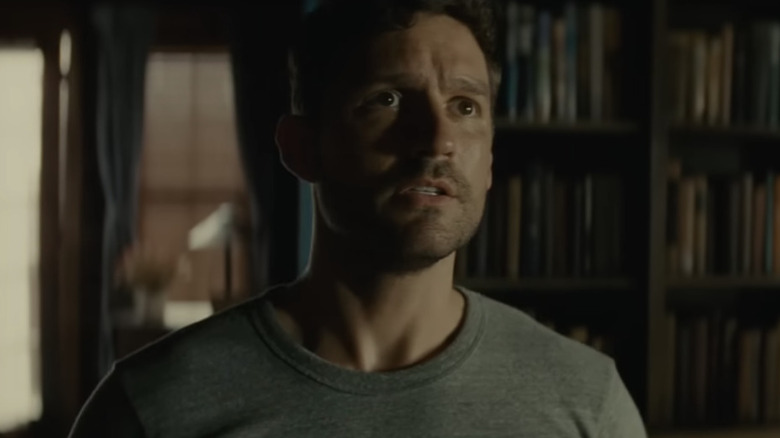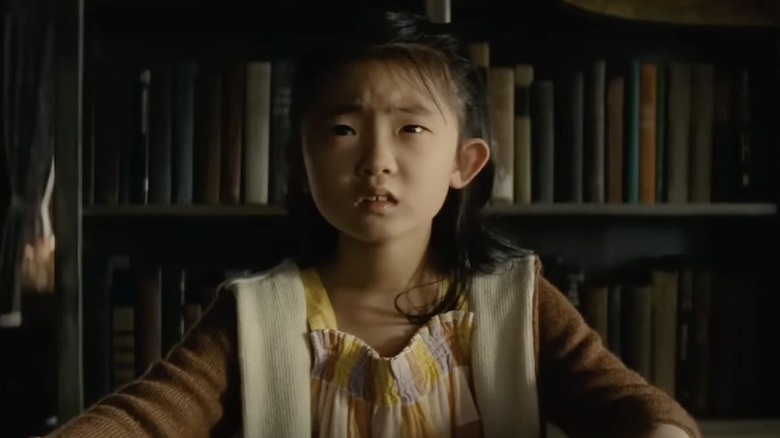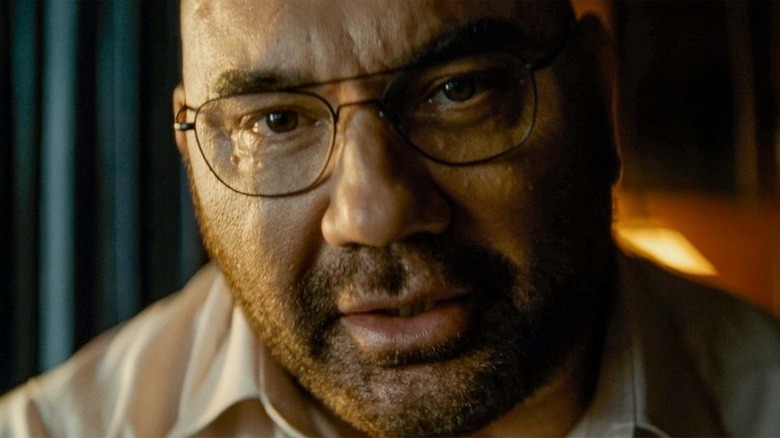The Ending Of Knock At The Cabin Explained
Legendary director M. Night Shyamalan returns with another nail-biting thriller full of tantalizing twists and turns in "Knock at the Cabin." The film, based on Paul G. Tremblay's 2018 novel "The Cabin at the End of the World," sees a family's cabin vacation upended by four strangers, who arrive holding strange-looking weapons. Although the four say that they're not there to hurt the family, they do offer them a cryptic choice: The family must choose to sacrifice one of their own in order to stop the apocalypse. If they fail to do so, then the end of the world will be set in motion and the fate of humanity will be at stake. So, with everything on the line, everyone is forced to come to terms with their beliefs and deal with some shocking revelations.
Shyamalan helms a real nerve-shredder with "Knock at the Cabin." As tensions reach a hot boiling point and the clock ticks, viewers are left anxiously wondering who's telling the truth and what this will all come to. The stakes get raised over and over again and when that classic Shyamalan twist comes, you're left stunned by an emotional fallout that rocks you to your core. "Knock at the Cabin" has a lot going on in its intense finale that audiences may miss or even feel confused about. So, let's delve into this thriller's final act in this explanation of the end of "Knock at the Cabin."
What is the choice they have to make?
"Knock at the Cabin" centers around the choice that's posed to couple Andrew (Ben Aldridge) and Eric (Jonathan Groff) and their young daughter Wen (Kristen Cui). Four strangers arrive at the cabin where Andrew, Eric, and Wen are staying and take control of the house. They tie up Andrew and Eric and tell them that the four of them have been united by a shared vision of an apocalyptic event that will end humanity if a choice isn't made. Andrew, Eric, and Wen are tasked with picking which one of them will be sacrificed to stop the world from ending.
Every time the family says "no" to deciding which one of them will die, the four strangers are forced to kill one of their own and a plague gets unleashed on the world that will see a large number of people die. If it gets to a point where all four of the strangers die, then Andrew, Eric, and Wen will live only long enough to watch the rest of the world burn around them and wonder if they could have prevented it. It's a dilemma that at one point is described as "the impossible choice" and leads to bloodshed and intense feelings, as Andrew and Eric each wrestle with believing the strangers and finding a way to get out of this situation.
How the trolley problem fits in
The central choice in "Knock at the Cabin" is an example of a common ethics thought experiment called "the trolley problem" (via Brittanica). This scenario imagines someone being told that a trolley's brakes have failed and it is barreling towards a group of people tied to the tracks. This bystander has the chance to intervene and flip a switch that would send the trolley on an adjacent track, where it would kill just one person.
It's an interesting problem that probes at how you view situations and what you value, as it explores this idea of whether or not it's more ethical to save more people but do so at the cost of one person's life. It dissects the choices and consequences of action versus inaction, as you can choose to interfere to protect more people or do nothing and let the trolley run its course.
In "Knock at the Cabin," Andrew, Eric, and Wen deal with this dilemma of killing one of their own to save the rest the world. It's fitting that Leonard (Dave Bautista), the leader of the four strangers, defines this as an "impossible choice" because it requires them to lose one of their loved ones. It's not just about numbers for them — one versus many — because for these three characters, the weight of each other's life is very real, while that of everyone else is more abstract. "Knock at the Cabin" elevates the trolley problem to a grander and more emotional scale, which is partly why the film is so engaging and relatable.
Why do the family's flashbacks matter?
As Eric and Andrew refuse to make the choice and the strangers unleash horrifying plagues on humanity, there are flashbacks played throughout that show Andrew and Eric's life together before their encounter with these strangers. They involve Eric and Andrew going to adopt Wen, Andrew being attacked at a bar by a homophobic patron, and the three of them arriving at the cabin. So, what's the importance of these flashbacks? Ultimately, they embody the reason that Eric and Andrew simply can't sacrifice one of their own.
From dealing with disapproval from their parents and the outside world for their love to becoming parents and having a child they deeply love, these two have been through a lot together. Eric helped Andrew work through some of the trauma from his attack and the two of them have been there for each other when others weren't.
As we see in these flashbacks and in the present, there's a deep love between Andrew and Eric that's hard to break, which Leonard even acknowledges, as he tells them that he's "never seen a family have such pure love like they do." These flashbacks play a pivotal role in helping viewers understand Eric and Andrew's inability to make this choice that's put upon them, even knowing what it might mean for the world.
What is Andrew's logic?
Throughout "Knock at the Cabin," Andrew is the voice of reason. He refuses to believe what the strangers are saying and his strong-willed logic is a key factor in leaving viewers unsure of what's real or not. Andrew sees this situation through an analytical lens and often tries to find explanations that can expose the strangers' lies.
For example, Andrew points out that the news broadcasts the strangers show them — which depict the apocalyptic events that they said would come — could have been carefully timed by the group. Perhaps these news stories were already in the works and since the four strangers all wear watches, this could just be a matter of them knowing what was going to happen beforehand and using that information to scare his family.
More significantly, Andrew believes that they have been targeted because he and Eric are gay. He thinks that Redmond (Rupert Grint) might be the man who attacked him at the bar and his conviction — based on his real lived experiences — is so strong that he gets Sabrina (Nikki Amuka-Bird) and Adriane (Abby Quinn) to doubt their own beliefs.
However, as it becomes clearer that there might be more at play than Eric and Andrew initially realized, Andrew's logical thinking reveals itself to be a cover for the fear he's feeling about the inevitable. Andrew is arguably the most complex and compelling character in "Knock at the Cabin" due to his brand of thinking and the way he makes viewers question their own beliefs of what's real in this world.
Who is the man in the light?
During the first ritual sequence where the strangers kill Redmond in order to release a plague, Eric notices something in the light shining through the window. In a quick flash, the light-filled visage of a figure can be seen. It's subtly ominous and marks a significant moment of wondering what is really going on here in this cabin.
Throughout the film, Eric questions what he saw and if it was real or just a byproduct of his concussion. As we see the truth of these apocalyptic events unfold over time, it becomes clear that this figure in the light wasn't just a figment of Eric's imagination.
It's never explicitly said who or what Eric saw but based on the themes of the film, we can consider different interpretations of it. "Knock at the Cabin" centers around the question of belief and what happens when our beliefs of the world and its rules get challenged. Andrew lives in a space of logic, which has no room for the truth or even possibility of what the strangers are saying. Eric is less sure of himself, so perhaps this figure of light is an angel, mystical being, or even God coming down to Earth in this crucial moment to try to convince him that there's something more happening here beyond what he knows or understands.
It's a shame that the film never offers any real explanation of what this mysterious "man in the light" is, but regardless, its appearance does play a strong role in the ongoing guessing game and ultimately, gets Eric to open his eyes and see the light.
Is it real?
Now, for the million-dollar question: Will the world really end if Eric and Andrew refuse to sacrifice one of their own? The answer, shockingly, is yes. While it seems like maybe Andrew was right and that the strangers' visions were just delusions or that Redmond brought them there to torture him and Eric, it becomes clear that they weren't lying once Leonard is the only one left.
When Leonard is the last stranger left, he shows Eric and Andrew a newscast of hundreds of planes crashing out of the sky. At this point, both the characters and viewers realize that it's a bit too far-fetched to believe that the strangers coordinated something to that scale, which is further underscored by Leonard's exact recitation of the news anchor's speech, sighs and all. It's enough to make anyone believe that this isn't a hoax, after all.
Eric and Andrew are stunned by this revelation and are left with one more choice to try and stop the world from ending. Bautista's incredible performance sells this shocking twist perfectly and in this moment, the weight of every disaster that's happened throughout the film crashes down on you. Shyamalan doesn't follow this up with some other twist that disproves this sudden realization, so it's really true: The things the strangers said would happen are happening and because Eric and Andrew struggled to believe them, the world is now on the verge of ending.
What do Leonard's final words mean?
When Leonard finds himself as the only stranger remaining, he decides to have one last exchange with Eric and Andrew outside the cabin. He further divulges his motivations for coming to them and what he saw in the visions. Leonard describes the visions of the apocalypse as feeling like a horrible nightmare, as he heard the screams of the children that he gives guidance to as a teacher. He felt completely helpless seeing them and the world burn.
That sense of dread and the heart-wrenching idea that the ones that Leonard loves would perish in a fiery apocalypse drove him to lead this small group of seers. Now, it's all he thinks about, since the world is on the brink of destruction.
After spilling his guts this last time to Eric and Andrew, he asks them if they'll make the choice. Although the audience isn't shown their response, Leonard's actions say it all: Leonard draws a knife from his side-holster and says that humanity has been judged before taking his own life. It's a subtle but powerful shift as up until now, Leonard and the other strangers have talked about the world facing judgment, which could go either way.
Here, Leonard — as the last stranger standing — makes a definitive statement that seems to seal humanity's fate. With his death, Eric and Andrew have mere minutes to make a choice to try to stop the end.
If you or anyone you know is having suicidal thoughts, please call the National Suicide Prevention Lifeline by dialing 988 or by calling 1-800-273-TALK (8255).
Are the strangers the four horsemen?
At first glance, the four strangers that arrive at the cabin seem like four ordinary people. When they first introduce themselves to Eric, Andrew, and Wen, they talk about their general interests and regular lives that don't seem so different from anyone else. So, it's tough not to wonder why they were chosen and if they serve a greater purpose than maybe even they realize.
Shortly after Leonard dies and Eric gains immense clarity, he comes to the conclusion that they do. Eric believes that based on everything that's happened and the distinct qualities that each of the strangers has, these four people embody the Four Horsemen of the Apocalypse. In the Book of Revelations, the Four Horsemen of the Apocalypse are seen as the harbingers of the end of time and each symbolizes a different end of humanity: conquest, war, famine, and death (via Public Domain Review).
Here though, Eric interprets each stranger as a positive quality of humanity, rather than as a means of its end. For instance, Leonard personifies guidance, as seen in the way he leads the group and in his background as a teacher while Sabrina stands for healing, which we see when she tries to tend to Eric's concussion.
But now that the four of them have been snuffed out, humanity's best qualities are gone with them, leaving the world open to destruction. It's a crushing realization overall that not only gives deeper meaning to the four strangers but also makes Eric realize that a choice needs to be made.
Eric finds his peace
With only minutes left until the world's fate is sealed, Eric decides to make a choice and offers himself to be sacrificed. Over the course of the film, Eric has become the most connected with the strangers and has been less resistant to their mission than Andrew. That — plus his experience of seeing the figure in the light — has opened him up to the truth of what's happening, even if he wishes it weren't so. He comes to see that the only way for Wen to live a full life is for him to make the choice.
Eric is in a clearer state of mind than Andrew and has found a euphoric peace in thinking about Andrew and Wen years down the line, feeling happy and healthy and living their lives. Eric beautifully delivers a monologue that pairs with a flash forward, which shows viewers exactly what he hopes for: Andrew and Wen, both older, laughing together. It's the last memory he wants to think about before going, as he says, "wherever I go next."
Eric is ready to make the sacrifice that will give the ones he loves a chance at a real future in an imperfect world. Although Andrew struggles at first to give Eric his wish, he eventually finds the strength to shoot Eric in the chest. Thus, with Eric's sacrifice, the choice is made.
The world starts to repair
So, with Andrew and Eric making their choice and Eric dying to save his family, the only question that remains is: Was it in time? At first, it doesn't seem like it since the skies are still dark and stormy. Lightning strikes all around Andrew, as he climbs into the treehouse to see Wen. It feels like the world is collapsing around them and the two of them weep over the loss of Eric. The two of them head to a local diner, where they discover that Eric's sacrifice came just in time to save the world.
At the diner, Andrew and Wen see news reports about the disasters stopping: The water from the tsunamis starts to recede, those affected by viral outbreak begin to recover, and planes stop falling from the skies. Even the rain that now falls around them is putting out fires from the plane crashes. The world starts to feel hopeful again.
We see other patrons in the diner talking to loved ones and expressing their happiness that others are safe and healthy. After such an intense turn of events in the film, this reveal of others connecting with their loved ones — plus the apocalyptic events ending — gives viewers a meaningful moment of calmness and shows that Eric's sacrifice had real meaning.
How does the ending differ from the book?
At the end of the film, Andrew and Wen sit in their car, overwhelmed by their raw grief. It's a somber moment until they put on their favorite song, KC and the Sunshine Band's "Boogie Shoes," which connects them to happy memories of singing along with Eric. Their love for each other and Eric lives on, so they drive back home to the life that he dreamed for them. It's an incredibly moving and hopeful ending, which is different from Tremblay's novel.
M. Night Shyamalan spoke to Looper about the process of directing an adaptation, noting that "It was an interesting mix of taking an author's characters and then going in a new direction in this movie."
In the book, Wen gets killed by a stray bullet when Andrew and Leonard fight over Andrew's gun. However, since her death is an accident, Leonard says it doesn't count and the couple still needs to make a choice to stop the apocalypse. This leads Sabrina to abandon the mission completely: She kills Leonard and brings Eric and Andrew to Redmond's car before killing herself.
Eric considers taking his own life but Andrew convinces him not. He would rather let the world burn than live in one where Wen's death is insufficient. The two of them take Wen's body and walk through the woods, accepting whatever comes their way, which is a much darker ending than Shyamalan's vision.
Shyamalan told Digital Spy that he "felt very strongly that the story can't go the way it was written" and when he called Tremblay to tell him his new ending, the author revealed that this was how the book was originally going to end.
If you or anyone you know is having suicidal thoughts, please call the National Suicide Prevention Lifeline by dialing 988 or by calling 1-800-273-TALK (8255).
Could there be more?
At the moment, there's been no announcement that a sequel to "Knock at the Cabin" is in the works. The film ends on such a powerful note that it's hard to imagine what could come next with these characters. That's not to say that it couldn't happen though or that there isn't potential for a sequel story. After all, Eric does say that this choice is likely made by families every generation, so a follow up could focus on another family forced to makes this seemingly impossible choice. It could offer a unique perspective on this dilemma and bring in a new set of characters.
Shyamalan has also shown that he isn't opposed to doing sequels since "Split" and "Glass" were sequels to "Unbreakable" (via Time). He has been show-running his Apple TV+ series "Servant," which ends with its fourth season this year, so clearly he enjoys exploring various threads of stories that speak to him. Maybe Shyamalan will consider jumping back into the world of "Knock at the Cabin" sometime in the future, but for now, a sequel seems unlikely.
